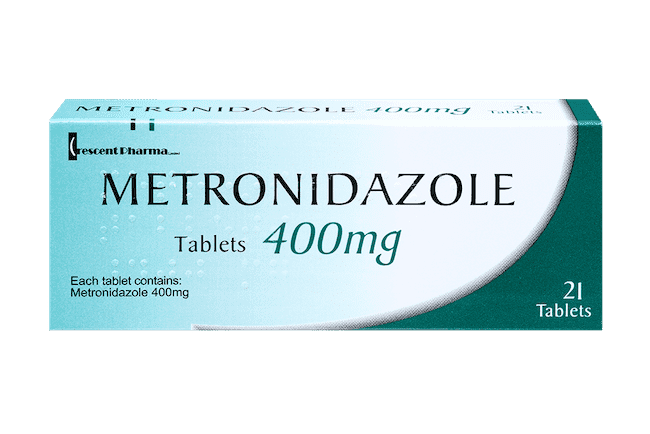Metronidazole: Side Effects, Dosage, Uses, Interaction

Metronidazole is in a class of medications called nitroimidazole antimicrobials. It works by stopping the growth of bacteria. Metronidazole capsules and tablets are used to treat infections of the reproductive system, gastrointestinal (GI) tract, skin, heart, bone, joint, lung, blood, nervous system, and other areas of the body.
Metronidazole capsules and tablets are also used to treat sexually transmitted diseases (STDs). Metronidazole extended-release (long-acting) tablets are used to treat bacterial vaginosis (an infection caused by too much of certain types of harmful bacteria in the vagina) in women.
Metronidazole injection is used to treat certain skin, blood, bone, joint, gynecologic, and abdominal (stomach area) infections caused by bacteria. It is also used to treat endocarditis (infection of the heart lining and valves), meningitis (infection of the membranes that surround the brain and spinal cord), and certain respiratory infections, including pneumonia. Metronidazole injection is also to prevent infection when used before, during, and after colorectal surgery.
Antibiotics will not work for colds, flu, or other viral infections. Using antibiotics when they are not needed increases your risk of getting an infection later that resists antibiotic treatment.
Before using metronidazole injection,
- tell your doctor and pharmacist if you are allergic to metronidazole, any other medications, or any of the ingredients in metronidazole injection. Ask your pharmacist for a list of the ingredients.
- tell your doctor if you are have taken or are taking disulfiram (Antabuse). Your doctor will probably tell you not to use metronidazole injection if you are taking this medication or have taken it within the last 2 weeks.
- tell your doctor and pharmacist what other prescription and nonprescription medications, vitamins, nutritional supplements, and herbal products you are taking or plan to take. Be sure to mention any of the following: anticoagulants (‘blood thinners’) such as warfarin (Coumadin, Jantoven), busulfan (Buselfex, Myleran), cimetidine (Tagamet), corticosteroids, lithium (Lithobid), phenobarbital, and phenytoin (Dilantin, Phenytek). Your doctor may need to change the doses of your medications or monitor you carefully for side effects. Many other medications may also interact with metronidazole injection, so be sure to tell your doctor about all the medications you are taking, even those that do not appear on this list.
- tell your doctor if you have or have ever had Crohn’s disease (a condition in which the body attacks the lining of the digestive tract, causing pain, diarrhea, weight loss, and fever), a yeast infection, edema (fluid retention and swelling; excess fluid held in body tissues), or blood, kidney, or liver disease.
- remember not to drink alcoholic beverages or take products with alcohol or propylene glycol while receiving metronidazole injection and for at least 3 days after treatment is finished. Alcohol and propylene glycol may cause nausea, vomiting, stomach cramps, headache, sweating, and flushing (redness of the face) when taken during treatment with metronidazole injection.
- tell your doctor if you are pregnant, plan to become pregnant, or are breast-feeding. If you become pregnant while using metronidazole injection, call your doctor.
How should metronidazole be used?
Metronidazole comes as a tablet, an extended-release tablet, and as a capsule to take by mouth. Metronidazole capsules and tablets are usually taken as a one-time dose (or divided into two doses on 1 day) or two to four times daily for up to 10 days or longer. Metronidazole extended-release tablets are usually taken once daily at least 1 hour before or 2 hours after a meal for 7 days. Follow the directions on your prescription label carefully, and ask your doctor or pharmacist to explain any part you do not understand. Take metronidazole exactly as directed. Do not take more or less of it or take it more often than prescribed by your doctor.
Swallow the extended-release tablets whole; do not split, chew, or crush them.
Metronidazole injection comes as a solution and is infused (injected slowly) intravenously (into a vein). It is usually infused over a period of 30 minutes to 1 hour every 6 hours. The length of treatment depends on the type of infection being treated. Your doctor will tell you how long to use metronidazole injection.
You may receive metronidazole injection in a hospital, or you may use the medication at home. If you will be using metronidazole injection at home, your health care provider will show you how to infuse the medication. Be sure that you understand these directions, and ask your healthcare provider if you have any questions.
You should begin to feel better during the first few days of treatment with metronidazole injection. If your symptoms do not improve or if they get worse, call your doctor.
Use metronidazole injection until you finish the prescription, even if you feel better. If you stop using metronidazole injection too soon or if you skip doses, your infection may not be completely treated and the bacteria may become resistant to antibiotics.
What side effects are possible with this medication?
Metronidazole injection may cause side effects. Tell your doctor if any of these symptoms are severe or do not go away:
• nausea
• vomiting
• loss of appetite
• stomach pain and cramping
• diarrhea
• constipation
• headache
• irritability
• depression
• weakness
• difficulty falling asleep or staying asleep
• dry mouth; sharp, unpleasant metallic taste
• furry tongue; mouth or tongue irritation
• redness, pain, or swelling at the injection site
Some side effects can be serious. If you experience any of these symptoms, stop using metronidazole injection and call your doctor immediately:
• rash
• itching
• hives
• skin blistering, peeling, or shedding in the area
• flushing
• seizures
• numbness, pain, burning, or tingling in your hands or feet
• fever, eye sensitivity to light, stiff neck
• difficulty speaking
• problems with coordination
• confusion
• fainting
• dizziness
Metronidazole injection may cause other side effects. Call your doctor if you have any unusual problems while using this medication.
Metronidazole Safety Information
You should not use metronidazole if you recently drank alcohol, or have taken disulfiram (Antabuse) within the past 2 weeks. Do not use metronidazole to treat any condition that has not been checked by your doctor.
Do not drink alcohol or consume foods or medicines that contain propylene glycol while you are taking metronidazole and for at least 3 days after you stop taking it.
Seizures and other nervous system abnormalities have been reported in patients treated with metronidazole. You should stop using this medicine immediately if you experience any neurological symptoms such as seizures, headaches, visual changes, weakness, numbness, or tingling.
This medicine will not treat a viral infection such as the common cold or flu.
In animal studies (mice and rats), this medicine caused certain types of cancers or tumors. It is not known whether these effects would occur in people using this medicine. Ask your doctor about your risk.





